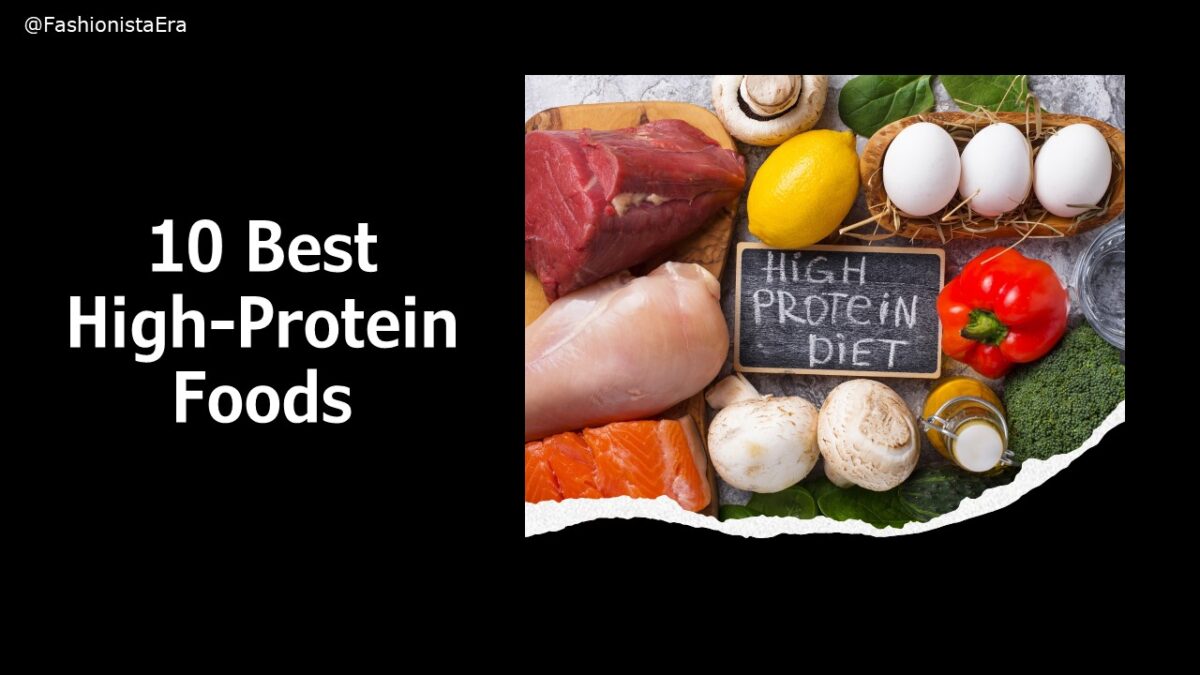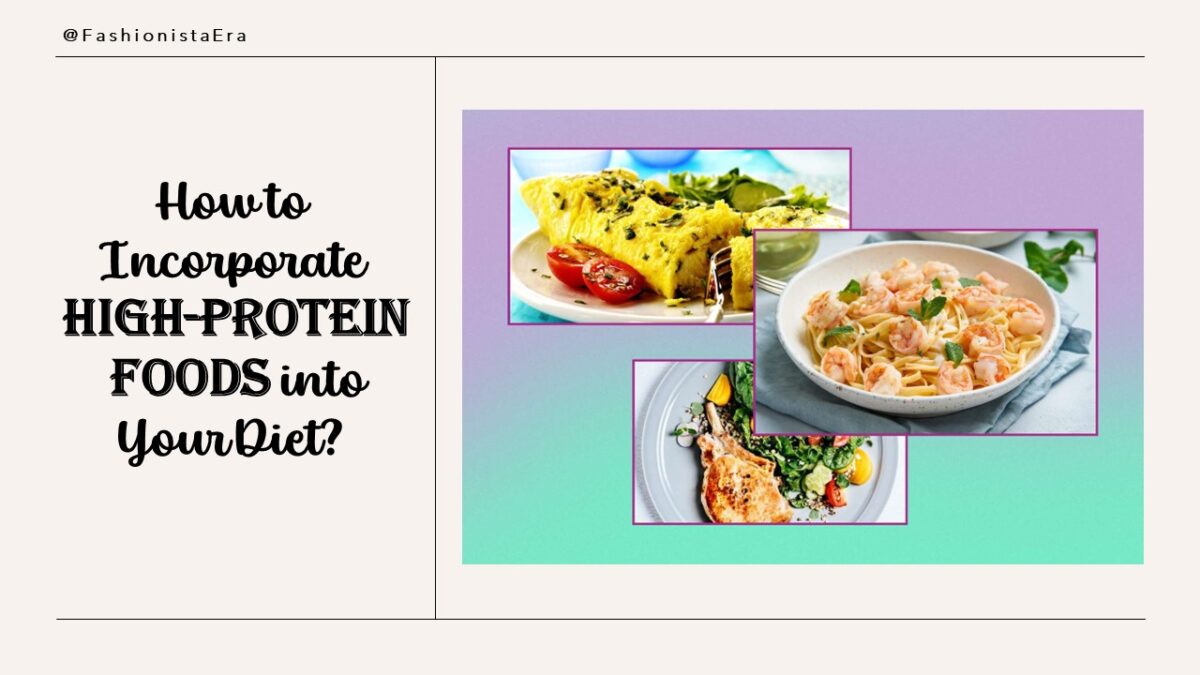Are you looking to incorporate more high-protein foods into your diet but don’t know where to start? Look no further! From eggs to lentils, we’ve compiled a comprehensive list of the Best high-protein foods to help you meet your nutritional needs. Whether you’re a meat-lover or prefer plant-based options, we’ve got you covered with a variety of delicious and nutritious choices.
Protein is an essential macronutrient that plays a crucial role in building and repairing tissues, maintaining muscle mass, and keeping you feeling full and satisfied. So, whether you’re an athlete looking to build muscle, a vegan seeking alternative protein sources, or simply want to feel more energized and satiated, our list of high-protein foods is the perfect place to start. Get ready to transform your diet and achieve a healthier, more balanced lifestyle!
Importance of Protein in Your Diet
Protein is one of the three macronutrients that our bodies need to function properly. The other two are carbohydrates and fats. Protein is made up of amino acids, which are the building blocks of our muscles, organs, and tissues. It is essential for growth and repair, and it also plays a vital role in many bodily functions, such as transporting oxygen and nutrients throughout the body, and producing enzymes, hormones, and antibodies.
Protein is especially important for athletes and people who engage in regular physical activity, as it helps to build and repair muscles. It is also important for people who are trying to lose weight, as it helps to keep you feeling full and satisfied, which can prevent overeating. In addition, protein is important for people who are recovering from an injury or illness, as it helps to repair damaged tissues and cells.
So, whether you’re looking to build muscle, lose weight, or simply maintain your overall health, it’s important to include plenty of high-protein foods in your diet.
10 Best High-Protein Foods

- Eggs – Eggs are one of the most nutritious foods on the planet. They are high in protein, healthy fats, and a wide range of vitamins and minerals. One large egg contains about 6 grams of protein.
- Chicken Breast – Chicken breast is a lean protein source that is low in fat and calories. It is also rich in vitamins and minerals. One 3-ounce serving of chicken breast contains about 26 grams of protein.
- Greek Yogurt – Greek yogurt is a creamy and delicious source of protein that is also high in calcium and probiotics. One cup of Greek yogurt contains about 23 grams of protein.
- Lentils – Lentils are a plant-based protein source that is also high in fiber, iron, and other important nutrients. One cup of cooked lentils contains about 18 grams of protein.
- Tuna – Tuna is a lean protein source that is also rich in omega-3 fatty acids. It is also low in calories and fat. One 3-ounce serving of tuna contains about 20 grams of protein.
- Quinoa – Quinoa is a gluten-free grain that is also a complete protein source. It is also high in fiber, iron, and other important nutrients. One cup of cooked quinoa contains about 8 grams of protein.
- Beef – Beef is a high-protein food that is also rich in iron, zinc, and other important nutrients. It is important to choose lean cuts of beef, such as sirloin or tenderloin, to avoid consuming too much saturated fat. One 3-ounce serving of beef contains about 22 grams of protein.
- Cottage Cheese – Cottage cheese is a low-fat, high-protein food that is also rich in calcium. One half-cup serving of cottage cheese contains about 14 grams of protein.
- Almonds – Almonds are a protein-rich snack that is also high in healthy fats and fiber. One ounce of almonds contains about 6 grams of protein.
- Edamame – Edamame is a plant-based protein source that is also high in fiber and other important nutrients. One cup of cooked edamame contains about 17 grams of protein.
- Chickpeas: Chickpeas are a good plant-based source of protein. A cup of cooked chickpeas contains around 14 grams of protein.
- Salmon: Salmon is a fatty fish that is high in protein. A 3-ounce serving of cooked salmon provides around 22 grams of protein.
- Steak: Beef is a good source of protein. A 3-ounce serving of steak contains around 22 grams of protein.
Benefits of Consuming High-Protein Foods
There are many benefits to consuming high-protein foods. One of the most important benefits is that protein helps to build and repair muscles, which is especially important for athletes and people who engage in regular physical activity. In addition, protein helps to keep you feeling full and satisfied, which can prevent overeating and aid in weight loss. High-protein diets have also been shown to improve heart health, lower blood pressure, and reduce the risk of type 2 diabetes.
In addition to these benefits, high-protein foods are also important for people who are recovering from an injury or illness, as they help to repair damaged tissues and cells. They are also important for people who are trying to maintain their overall health, as they provide a wide range of important nutrients, such as vitamins, minerals, and antioxidants.
Nutritional Value of Each Food
Each of the high-protein foods listed above has its own unique nutritional profile. For example, eggs are high in protein, healthy fats, and a wide range of vitamins and minerals. Chicken breast is a lean protein source that is also low in fat and calories. Greek yogurt is high in protein, calcium, and probiotics. Lentils are a plant-based protein source that is also high in fiber, iron, and other important nutrients.
When choosing high-protein foods, it’s important to consider their overall nutritional value, as well as their protein content. Look for foods that are also high in vitamins, minerals, and other important nutrients.
Recipes Using High-Protein Foods
There are many delicious recipes that incorporate high-protein foods. For example, you could make a Greek yogurt parfait with fresh fruit and granola for breakfast, or a lentil and vegetable soup for lunch. For dinner, you could try grilled chicken with quinoa and roasted vegetables, or a beef stir-fry with brown rice and broccoli.
There are also many high-protein snacks that you can make, such as roasted almonds, edamame, or a sliced apple with almond butter.
Tips for Incorporating High-Protein Foods into Your Diet

If you’re looking to incorporate more high-protein foods into your diet, there are several tips that can help. First, make sure to choose a variety of protein sources, including both animal and plant-based options. This will help to ensure that you are getting a wide range of important nutrients.
Second, try to include high-protein foods in every meal and snack. For example, you could have eggs for breakfast, a turkey and vegetable wrap for lunch, and grilled salmon with quinoa and roasted vegetables for dinner. For snacks, try sliced cheese and apple, or a protein shake made with Greek yogurt and fresh fruit.
Finally, make sure to read labels carefully to determine the protein content of different foods. Look for foods that are high in protein, but also low in saturated fat, sodium, and added sugars.
High-Protein Snacks for On-The-Go
If you’re always on-the-go, it can be challenging to find high-protein snacks that are also convenient and portable. Fortunately, there are many options available. Some examples include:
- Protein bars – Look for bars that are high in protein, but also low in added sugars and other unhealthy ingredients.
- Jerky – Beef, turkey, or salmon jerky is a portable and protein-rich snack that is also low in fat.
- Nuts – Almonds, cashews, and pistachios are all high in protein and healthy fats. Just be sure to choose unsalted varieties.
- Hard-boiled eggs – Hard-boiled eggs are a convenient and protein-rich snack that can be made in advance and taken on-the-go.
- Greek yogurt – Single-serving cups of Greek yogurt are a convenient and tasty way to get a protein-rich snack on-the-go.
Common Misconceptions About High-Protein Diets
There are several common misconceptions about high-protein diets. One of the most common is that they are harmful to the kidneys. However, there is no evidence to support this claim. In fact, high-protein diets have been shown to be safe and effective for most people.
Another misconception is that high-protein diets are only for athletes and bodybuilders. However, high-protein diets can be beneficial for anyone, regardless of their level of physical activity.
Finally, some people believe that high-protein diets are difficult to follow or require expensive supplements. However, there are many affordable and delicious high-protein foods that are readily available at any grocery store.
Conclusion: Improving Your Health With Protein-Rich Foods
In conclusion, protein is an essential macronutrient that plays a crucial role in building and repairing tissues, maintaining muscle mass, and keeping you feeling full and satisfied. By incorporating more high-protein foods in your diet, you can improve your overall health and achieve a more balanced lifestyle. Whether you prefer animal or plant-based options, there are a wide range of delicious and nutritious high-protein foods to choose from. So, start incorporating more protein-rich foods into your diet today and reap the many benefits of a healthier, more balanced diet.

